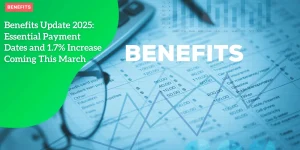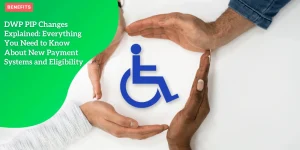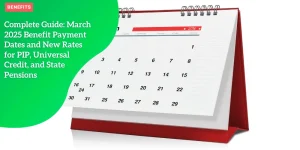Complete Guide: February 2025 DWP Payment Dates and Benefit Changes You Need to Know
Anúncios
Current Economic Landscape and DWP Changes
Overview of Current Economic Challenges and Inflation Rates
As 2025 unfolds, a rocky economic landscape is evident.
Everyday expenses such as household bills, groceries, mortgages, and rent have reached unprecedented highs.
Anúncios
The UK’s inflation rate, although down to 2.5% from its December peak, continues to impose financial strains on families.
This slight reduction in inflation has provided minor relief, yet the forecasted economic challenges remain concerning.
Anúncios
Proposed DWP Cuts to Sickness and Disability Benefits
Chancellor Rachel Reeves has encountered a challenging start to the year amidst these uncertainties.
Reports have suggested intentions to further cut sickness and disability benefits, beyond the already planned £3 billion savings.
With a consultation paper scheduled for spring, the government aims to reshape benefit structures while managing expenditure.
These potential cuts remain controversial, as many current recipients voice concerns about their impact on daily living.
Joseph Rowntree Foundation’s Poverty Projections for 2029
The projections by the Joseph Rowntree Foundation paint an alarming future for UK poverty rates.
If no intervention is undertaken by the government, an additional 100,000 children and 300,000 adults could plunge into poverty by October 2029.
Delays in essential aids such as winter fuel payments have only exacerbated the hardships faced by many households, as illustrated by recent lengthy delays.
While the economic terrain seems daunting, recognizing and preparing for these challenges can provide a pathway forward.
Practical strategies and updates on financial support programs can aid individuals in navigating through these trying times effectively.
February 2025 Benefit Payment Schedule
As 2025 progresses, understanding the detailed benefit payment schedule for February is essential.
Let’s help you keep track of the dates and crucial timelines regarding legacy benefits.

Complete List of Benefits Being Paid in February 2025
February is set to see a regular payment schedule with no disruptions due to bank holidays. The key benefits being paid include:
- 📆 Universal Credit
- 📆 State Pension
- 📆 Pension Credit
- 📆 Child Benefit
- 📆 Disability Living Allowance
- 📆 Personal Independence Payment (PIP)
- 📆 Attendance Allowance
- 📆 Carer’s Allowance
- 📆 Employment Support Allowance
- 📆 Income Support
- 📆 Jobseeker’s Allowance
Normal Payment Schedule
The Department for Work and Pensions (DWP) will ensure that all benefits are paid as scheduled in February. This is especially critical as there are no anticipated bank holiday disruptions this month, eliminating any concerns about delays.
Legacy Benefits Migration to Universal Credit Timeline
The DWP aims to complete the migration of all legacy benefits to Universal Credit by January 2026.
If you’re currently receiving tax credits, income support, jobseeker’s allowance, or housing benefit, you should have already started receiving notices about migrating to Universal Credit.
For those solely claiming Employment Support Allowance or with housing benefit, similar notifications should arrive by December 2025.
With this shift, the transition process will be aimed at simplifying and modernizing the benefit system to ensure a more streamlined service for all beneficiaries.
This chapter sets a comprehensive foundation on February’s benefit payment schedule and the migration timeline to Universal Credit.
Moving forward, we’ll delve into various support programs available to manage your finances effectively.
State Pension Payment Dates for February
Payment Schedule Based on National Insurance Number
Knowing when to expect your State Pension payment is crucial for managing finances.
Your payment date is determined by the last two digits of your National Insurance (NI) number:
- 📆 00 to 19: Monday
- 📆 20 to 39: Tuesday
- 📆 40 to 59: Wednesday
- 📆 60 to 79: Thursday
- 📆 80 to 99: Friday
This schedule ensures that payments are spread out evenly throughout the week, reducing the likelihood of delays due to banking bottlenecks.
If your payment date falls on a weekend or bank holiday, you will usually receive your pension payment on the preceding working day.
Four-Week Payment Cycle Explanation
Your State Pension payments are made every four weeks.
This means you will receive 13 payments per year.
This four-week cycle is designed to help pensioners manage their budget over a consistent period, allowing for better financial planning and stability.
Direct Bank Deposit Process
To receive your State Pension, it’s crucial to have a valid bank or building society account.
Payments are made directly into your account, ensuring timely and secure transactions.
Enrolling for direct deposit is straightforward and can be done by providing your bank details during your pension application process.
Understanding your State Pension payment schedule and process ensures smoother financial planning and stability.
Being aware of these details can help you manage your finances better and access your funds without unnecessary delays.
Additional Financial Support Programs
Household Support Fund Availability and Council Allocation
With the economic situation being complex, many households are turning to the Household Support Fund for help.
This fund, allocated to local councils, aims to assist vulnerable households facing financial difficulty.
Councils have the autonomy to decide how to distribute this aid, which may include cash grants, supermarket vouchers, or specific energy bill assistance.
Some councils even provide schemes to replace the winter fuel payment for pensioners.
To learn what support is available in your area, visit your local council’s website.
Budgeting Advance Loans and New Deduction Caps
For those on Universal Credit encountering financial emergencies, the government offers budgeting advance loans.
These loans are interest-free and have a maximum repayment period of two years.
Loan amounts vary:
- 📆 £348 for single individuals
- 📆 £464 for couples
- 📆 £812 for those with children
Labour’s latest budget has set a new cap on DWP deductions from benefit payments for loan repayments.
Starting in April 2025, the cap will be reduced to 15% of the standard allowance, down from the previous 25%.
Charitable Grants and Energy Provider Assistance Programs
Charitable grants provide another financial lifeline, often targeted at specific needs, such as disability, bereavement, or unemployment.
There are many grants available; each with its own set of eligibility criteria.
Energy providers also offer assistance for those struggling with utility bills.
Suppliers like Scottish Power, EDF, E.ON, and Octopus may provide support in various forms.
British Gas, in particular, offers grants up to £2,000 to customers of any provider, subject to meeting specific criteria.
Navigating these programs and understanding the new changes requires keeping up with updates and deadlines for applications.
Upcoming Benefit Rate Changes
Increase in Working-Age Benefits
From April 2025, working-age benefits will see an increase of 1.7%. This adjustment is crucial since it aligns with the inflation figure from September 2024.
This increase affects a variety of benefits, including Universal Credit, Personal Independence Payments (PIP), Disability Living Allowance (DLA), Attendance Allowance, Carer’s Allowance, and Employment Support Allowance (ESA).
State Pension Rise
The State Pension will rise by 4.1%, an increase secured under the triple lock mechanism.
This adjustment matches the wage growth observed in 2024 and translates into an approximate increase of £472 annually for pensioners.
This increment helps maintain the purchasing power of pensioners amidst the fluctuating economic landscape.
Expanded Childcare Support
New expansions to childcare support will also roll out this year.
Parents of two-year-olds are now eligible for 15 hours of free childcare, up from the previous limit.
Additionally, from September 2025, children under five will be eligible for 30 hours of free childcare.
These expansions aim to ease the financial burden on working families while supporting early childhood education.
Staying updated on these changes is essential for effective financial planning.
Ensure you check your eligibility and apply for the benefits that can support your family during this period.
How to Access Additional Help
Council Tax Reduction Application Process
Are you wondering how to cut down on your council tax? You might be eligible for a council tax reduction if you meet specific criteria or receive certain benefits.
This could result in reductions of up to 100%.
If you’re facing severe hardship and can’t afford to pay your council tax, your local council may offer additional discretionary reductions.
To apply, contact your local council.
Warm Home Discount Eligibility and Application
The Warm Home Discount scheme provides a one-off £150 discount on your electricity bill.
This discount is automatically taken off your energy bills if you are eligible.
Qualification criteria include being on a low income with high energy costs, or if you receive the guarantee credit element of Pension Credit.
Don’t miss out – check your eligibility and ensure you benefit from this crucial support.
Free Childcare Entitlement Changes and Deadlines
Big news for working parents! From April 1, 2025, parents will benefit from expanded free childcare entitlements:
- 📆 30 hours of free childcare for children aged 3 to 4 years
- 📆 15 hours of free childcare for 2-year-olds
- 📆 From September 2025, all children under five will be eligible for 30 hours of free childcare
To take advantage of the free childcare offer, apply online and reconfirm your eligibility every three months in time for each school term.
For working parents, tax-free childcare can also offer financial relief by providing 20p for every 80p you put towards childcare, up to a maximum of £500 a year.
Remember, staying informed and proactive in applying for these benefits can make a significant difference in managing your household finances.






